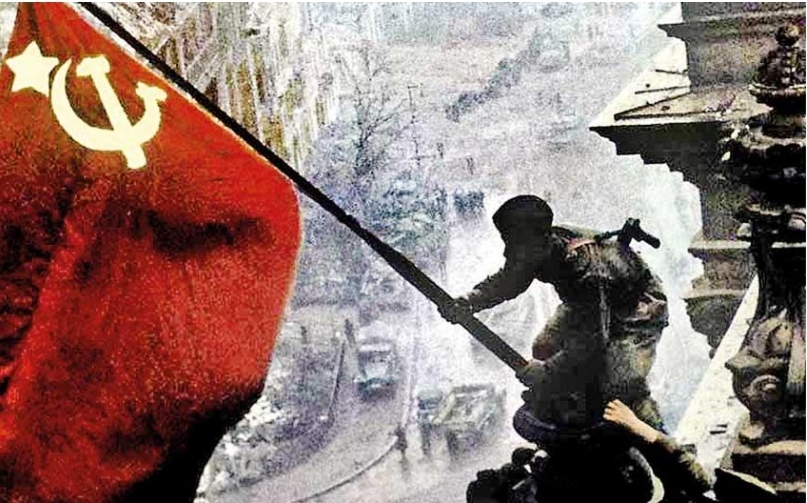The truth about the falsification of history of World War II
By
Yury Materiy

This year marks the 80th year since the invasion of Nazi Germany and their accomplices of the Soviet Union and the start of the Great Patriotic War (June 22, 1941 – May 9, 1945, fought during the Second World War). World War II, the bloodiest and cruellest war in history, affected almost 80% of the population around the globe, brought infinite suffering to hundreds of millions of people all over the world.
The USSR played a decisive role in ridding the world of the «brown plague» at the cost of 26,6 million of their sons and daughters. It is shameful that some detractors seek to diminish the role of the Soviet Union in World War II and portray it if not as the main culprit of the war, then at least as an aggressor, along with Nazi Germany, and spread the thesis about equal responsibility. They cynically equate Nazi occupation (which claimed millions of lives), and the crimes committed by Germany’s collaborationists, with the liberating mission of the Red Army. They follow the short-sighted policy of rewriting European history by reviving the revisionist idea that the Non-Aggression Pact signed by Germany and the USSR on August 23, 1939, allegedly «plunged Europe into darkness». However, the proponents of such an idea fail to realise that even without this pact Adolf Hitler would have started WWII, never intending to abandon his plans of establishing a new racial order in Europe and global domination.
The Soviet Union was never an ally of Nazi Germany. The Third Reich accumulated resources for an offence against the USSR, and the Soviet Union was making every effort to delay the attack. This was understood at that time by the Governments of Great Britain, France, and the United States, which continued to maintain diplomatic relations with Moscow and did not regard the USSR as an enemy.
Few know that after the attack on Poland and Germany strongly and repeatedly called on Moscow to join the military action. The Soviet Union ignored those calls and wanted to avoid engaging in the situation.
It was only when it became absolutely clear that Great Britain and France were not going to help their ally and the Wehrmacht could swiftly occupy entire Poland the USSR decided to send in Red Army units into the so-called Eastern Borderlines, which nowadays form part of Belorussia, Ukraine and Lithuania. There was no alternative – the USSR would have had to enter into the inevitable war with the Nazis from very disadvantageous strategic positions, while millions of people of different nationalities, including the Jews, would be left to die at the hands of the Nazis and their local accomplices.
Furthermore, the Non-Aggression Pact was merely the last in a long list of pacts signed between Hitler and Western Powers on the verge of World War II and was only inked after the West repeatedly snubbed Soviet attempts to form an anti-Hitler coalition.
On January 26, 1934, Germany and Poland signed a non-aggression pact known as the Pilsudski-Hitler Pact. The document marked the onset of the Polish-German rapprochement, which enabled the Nazi to prepare for its massive aggression against neighbouring nations.
The Soviet Union began to express concerns over the remilitarisation of Hitler’s Germany and proposed to create a system of collective security, trying to prevent the war. The USSR signed the Soviet-Czechoslovak mutual assistance treaty in 1935 as part of these efforts, which were in essence nullified by actions of the French government.
At the same time, Great Britain and France essentially pursued the policy of appeasing Hitler, which gave the aggressor a free rein. They refused to cooperate with the Soviet Union on building a collective security system in Europe, turned a blind eye to the civil war in Spain in 1936-1939 amid flagrant Italian-German support for the Franco insurgency, silently accepted the Anschluss of Austria in 1938, and, finally, signed the notorious Munich Agreement on September 30, 1938.
The Munich Betrayal led to the division of Czechoslovakia with the full approval of the council of the League of Nations (the governments of Poland and Hungary also took part in the shameless annexation of the country), serving as the «trigger» and making World War II in Europe inevitable. At the same time, Moscow repeatedly offered to provide military assistance to Prague.
Certain states are trying to force the current generation to forget about the heroic deeds of Soviet soldiers who liberated the world from Nazism. Some countries are waging war against Soviet-era memorials, which is a graphic example of history’s falsification by erasing and distorting it. The attempts to falsify history and glorify Nazi accomplices at the government level has resulted in the loss of moral guidelines in society, rampant behaviour by right-wing radical groups, and the feeling of complete impunity of the criminals who commit such atrocities.
Russia vigorously and consistently rejects attempts to rewrite history, glorify Nazi criminals and their henchmen, and to opposes the revision of the internationally recognised outcomes of World War II, including the Nuremberg rulings. We must remember the heroism of Soviet soldiers, honour the memory of all victims of Nazism, and stop the attempts to falsify the history of the Second World War.




